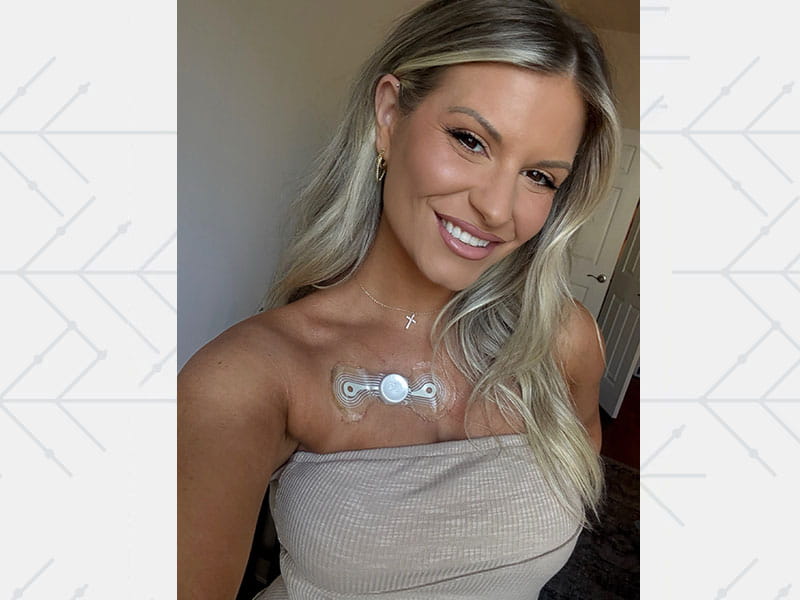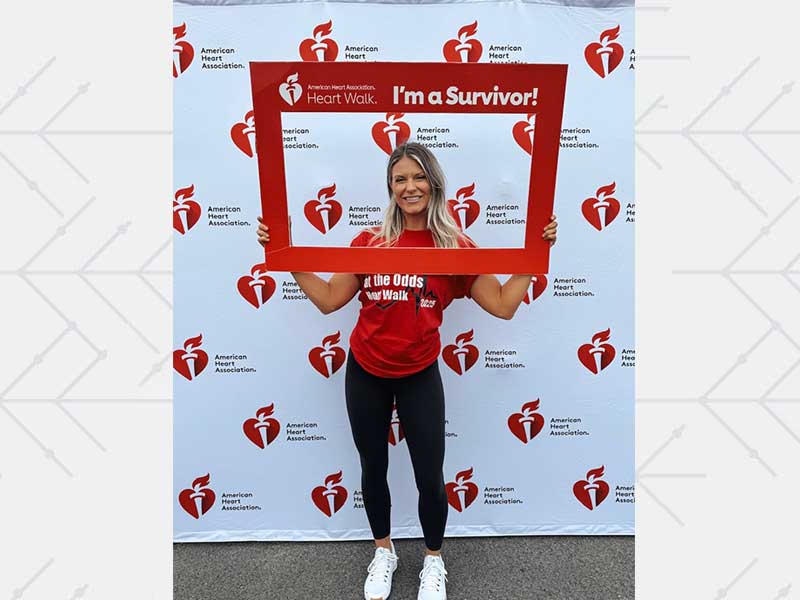Fear after a heart attack is real. Here's how to cope.
By American Heart Association News

Julie Iacovelli’s heart attack seemingly came out of nowhere.
She was 31, worked out regularly and had just had her annual checkup the day before. When she started feeling “a weird kind of nausea” and other symptoms one morning in December, she thought it was an anxiety attack. It turned out to be a completely blocked coronary artery. After she had three stents inserted to open the artery and spent four nights in the hospital, she returned to her home in Swedesboro, New Jersey.
Her struggle was just beginning.
“My brain couldn’t process what happened,” Iacovelli said. She couldn’t sleep; the life-threatening experience kept repeating in her head. “I’m replaying it, replaying it, replaying it, and that would send me into an anxiety attack, because I was so petrified of it happening again.”
By January, she was calling 911 regularly, because every twinge and minor pain felt like a sign of another heart attack.
“Every single night, I would look at my boyfriend and just bawl my eyes out,” Iacovelli said. She asked herself, “How could this happen to me? Why is this happening to me?”
While Iacovelli’s heart attack was unusual, her mental health struggle afterward was not.
Heart attacks commonly provoke psychological distress in survivors, according to an American Heart Association scientific statement published in September in the journal Circulation. Up to half of people hospitalized for a heart attack report anxiety or post-traumatic stress disorder. Up to a third of survivors experience depression.
Dr. Jeff Huffman, a professor of psychiatry at Harvard Medical School in Boston who helped write the statement, said the fear that follows a heart attack is understandable.
“For many people, having a heart attack is a sudden and abrupt medical event, one that they maybe didn’t see coming,” he said. It can be terrifying, and afterward, people may think, “Who’s to say I’m not going to have another one today or tomorrow or the next day?”
Such fear, he said, “is completely normal.”
How a heart attack and psychological health are linked
After a heart attack, psychological stress can lead to physical risks.
Depression after a heart attack is associated with a greater risk of having another cardiovascular event, Huffman said.
A heart attack itself can trigger inflammation that can induce depressive-like symptoms such as withdrawal, inactivity and social disengagement, the scientific statement said. At the same time, depression is associated with inflammation and blood clot formation, Huffman said.
Importantly, he said, depression also can hinder healthy behavior.
“If you have a heart attack, your doctors and your medical team may well ask you to make lots of really important life changes,” Huffman said. People who are depressed are less likely to be able to follow through with changing their diet or to stop smoking or to get more active.
“And that obviously has real implications for the likelihood that they’ll recover well, and the likelihood that they'll have another cardiovascular event,” he said.
How to manage fear after a heart attack
Worry after a heart attack is normal, Huffman said. But if it’s preventing someone from doing things that would help them recover, “that’s really a red flag, and that’s when it’s time to get some help.”
Among the things that Huffman said can help:
- Cardiac rehab, a medically supervised program of exercise, counseling and training, connects survivors with a team whose whole job is to help people recover from cardiac events, Huffman said. “These are real experts.” They can oversee a safe return to physical activity, he said, and conduct mental health screenings. The rehab setting also lets survivors see other people sharing their experience.
“You’ll see that you’re not the only one who’s got some uncertainty,” Huffman said. “You’ll see you’re not the only one who is still trying to trust your heart again. And just having that experience of meeting and working with other people who are in the same boat as you or in similar situations can be tremendously reassuring.”
- Asking specific questions.
Talk with your medical team about what is and isn’t safe, Huffman said. “Really nail them down on it so that you can have the reassurance.” That way, if you start to worry about an activity, you can “do a little self-talk and remind yourself, ‘My cardiologist said this was OK.’”
- Counseling or medications.
If the other steps aren’t helping, talk to your primary care doctor about a referral to a mental health expert, Huffman said. Cognitive behavioral therapy can help people distinguish realistic concerns from irrational fears, he said. “And sometimes medication to treat a mental health disorder can make a huge difference in people’s ability to feel comfortable enough to get back into their life.”
What worked for one survivor
Many of those elements were part of Iacovelli’s recovery.
Doctors suspect her heart attack was caused by a spontaneous coronary artery dissection, or SCAD, a tear in an artery wall.
Her symptoms started at breakfast and included nausea, weakness and dizziness. Her left arm felt “like it weighed a thousand pounds.”
After Iacovelli came home, a simple trigger such as a breath that didn’t feel right or a tingling sensation in her hand could send her anxiety spiraling.
“I was in a very, very bad place,” she said. “I was becoming one with my couch.”
Cardiac rehab helped a lot. “The fact that it got me out of the house in such a depressive state is huge,” she said. “Being hooked up to the monitors and being actively looked at” while exercising eased her fears.
Support from the nurses there made her feel less alone. So did seeing others in her situation. “When you go to cardiac rehab, you’re surrounded by all of these people that maybe aren’t dealing with the exact same thing but are dealing with something very, very similar.”
Iacovelli continued to see a therapist who had been helping with her anxiety previously. “We’ve been incorporating a lot of grounding and mindfulness,” she said.
A prescription antidepressant also helped.
And she talks about what happened “as much as I possibly can.” She’ll be acknowledged during a Go Red for Women event this month in Cinnaminson, New Jersey.
She still has ups and downs. “I have more good days than bad days, but man, when those bad days hit, they hit like they never went away.”
But support from her boyfriend, Jerrett Clark, has helped get her through her most challenging moments.

A focus on strength
Caregivers can play an important role by helping a survivor focus on their strengths, Huffman said. They can help survivors remember how they’ve gotten through other difficult times, “or how they’ve accomplished something really cool,” and the traits they used – perseverance, optimism, gratitude or something else.
“I think helping people not just to avoid fear or avoid the negative, but also to remember that they have some real strengths and resilience … can feel really good and can help people recover faster,” Huffman said.





